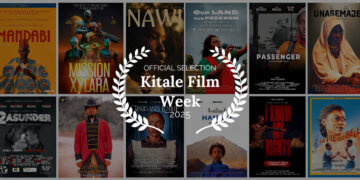Peter Pages Bwire was born a fisherman in Port Victoria, a small fishing town in Western Kenya on the shores of Lake Victoria. Fishing has been in his family for generations, and he takes immense pride in it. In fact, it was the first thing I learnt about him when we met at a film distribution incubator in Lagos.
“It’s who I am,” he tells me once again as we sit down for this interview over Zoom. He’s knee-deep in the final preparations for the third edition of Kitale Film Week, a film festival he founded in 2023. “My dad is a fisherman, or at least he used to be before venturing into other things. He was born into it, just like me, and he ran a fishing company for years. My mother is also a fisherman, and her entire family is still fishing in Lake Victoria today.”
Despite his strong connection to the trade, Bwire always knew he wanted to be a storyteller. “I started reading stories when I was very young. By age seven, I was reading The Merchant of Venice,” he says. You wouldn’t expect anyone to be reading Shakespeare at that age. “I had older brothers who were studying such books in high school, the so-called setbooks, so I had access to them early. I loved reading, and I would ask my dad and my mum questions about the stories because they, too, loved books.”
In their household, reading was a culture, almost an obligation. “My dad was strict about us learning English. He’d be upset if we were not consistent with our reading. He wouldn’t let us go two weeks without reading a new story,” Bwire says.
Getting into film was a very natural process for him, it had the perfect mix of what he was looking for: storytelling and fiction. “As some point, I wanted to be journalist,” he says. “But news felt too real for me. I wanted something I could escape to.”
For his undergraduate, Bwire studied theatre and film at Kenyatta University but briefly got derailed by his first job as a marketer – a student work induction program that didn’t give him many options. “I knew marketing wasn’t for me,” he says. He walked away from it all after one year. “I didn’t want to work on a film set, or even act on stage. I wanted to do something that would change the film industry.”
Then, the world stopped. In 2020, as the COVID-19 pandemic forced lockdowns, Bwire returned home to Kitale. Although he hadn’t yet found his big idea, he had already put many things in motion that would lead him to found Kitale Film Week. Back in 2016, he had organized his first film festival – a small Christian film festival – that led him to the Mandela Washington Fellowship. This, in turn, opened the doors for him to partner with the Hip Hop Film Festival where he helped organise a couple of events in Nairobi. He then pursued his post-graduate studies in film business in the UK.
Back in Kitale, he wrestled with what to do with his expertise. He knew he wanted to work in film distribution but how? “COVID 19 was taking longer than anyone expected,” he says. “During this time, I experimented with writing scripts and producing them, but it wasn’t working. I had no passion for film production.”
In 2021, while participating in the French-African Foundation program, Bwire began developing the idea of a film lab to train filmmakers. Working with a team of filmmakers, this initiative spanned three cities across two continents – Paris, Dakar and Montpelliere. The idea became too big for a lab.
“It was so complex that even the judges we were pitching to thought it wasn’t possible,” Bwire says. Returning to Kitale once again, his idea of a film lab quickly developed into a film festival, a more urgent need for the industry he wanted to change. “I realised that audience building and film distribution were even more pressing issues than offering film production training.” Thus, Kitale Film Week was born.
First held in 2023, the 8-day film festival showcases films from across the continent, alongside panels, workshops, masterclasses and school mentorship programs for primary and secondary school in Trans Nzoia. Bwire is also the festival director, working with a small management team that includes competition manager Wangui Ngunjiri and festival coordinator Joel Tugaineyo.

The third edition which kicked off on 2 February until 9 February features a particularly diverse line-up of over 50 films from 20 countries, selected from over 300 submissions. Some films to expect includes Kenya’s 2025 Oscar entry Nawi (the festival’s opening film), Cape Verdean coming-of-age drama Hanami, Ghana’s Ramsey Nouah-led comedy A Country Called Ghana, and Uganda’s sci-fi thriller Mission Xylara, set in 2056.
The festival also honours African classics like Ousmane Sembène’s Mandabi (Senegal, 1968), the musical comedy Life is Rosy (La Vie est Belle), starring Papa Wemba in a rags-to-riches tale set in Kinshasa (DRC, 1987), Ivory Coast’s Dancing in the Dust (1989) and Kenya’s first Oscar entry Nairobi Half Life (2012), from director Tosh Gitonga.
For Bwire, showcasing these classics that have shaped Africa’s cinematic history in Kitale – where he’s also trying to create his own history – is deeply significant. “A lot of great African films have been released in our lifetime but many of them remain inaccessible,” says Bwire. “These films need to be seen by African audiences they were made for.”
But Kitale Film Week is more than just a festival or a chance for locals to watch films they would have otherwise never been introduced to. It’s part of Bwire’s larger vision to transform the small, predominantly agricultural Western Kenyan town into a thriving film hub. “My hope is that this festival will elevate Kitale and the county of Trans Nzoia such that film becomes a key driver in the town’s economic and creative growth. That is what matters most to me.” Bwire says.
It’s a daunting task. Funding remains a major challenge, but support of institutions such as the French Embassy, the County Government of Trans Nzoia, and the Embassy of the Netherlands has been instrumental. Infrastructure is another hurdle. “There are no dedicated film venues in Kitale so we have to modify spaces and pop-up venues for our screenings and events,” Bwire says. With these unconventional spaces, they’ve had to adapt to audience preferences. “The more we do this, the more we discover spaces our audiences are most comfortable in. If they don’t like it – we can always tell from the number of people that show up – then we change it.”
Bwire acknowledges that cinema culture in Kitale is still in its infancy, and that there’s a lot of work to be done to nurture it. Three editions in, he admits that while some aspects have become easier, others have only grown more demanding. “Expectations grow, that means there’s more pressure to get it right,” he says.
He learnt a lot in the first year of setting up. “Initially, there was some disconnect between the audience and the films we were screening,” he says. “People would watch the films but they were not engaging with them in the way we hoped. Discussions would quickly move to other things, forgetting the films altogether.” Now, he sees a shift in perception. “People aren’t attending just for the excitement of the festival itself. They’re looking forward to actually watching the films and talking about them,” Bwire says.
Even though he’s already seen most of the films during the selection process, Bwire is eager to experience them with the audience. “Our audience is predominantly made up of people from the community,” he says. “I love the experience of watching films with people who have no connection to the industry.”
He’s also keen to do more for emerging filmmakers. While the festival is backed by big names such as Sembène, Nouah, and Gitonga, a significant portion of this year’s lineup features films from up-and-coming filmmakers. Regrettably, few are from the region the festival is based – Trans Nzoia or even Western Kenya. “In three years of running the festival, I’ve seen fewer than 10 films from Kitale, all short films. We’re hosting the first North Rift and Western Kenya Film Summit to address some of these challenges so I’m also looking forward to that,”Bwire says.
This speaks to a much larger issue. The Kenyan film industry remains heavily centred in Nairobi, rarely expanding beyond the capital to invest in the other 46 counties. Outside of Nairobi, there’s hardly any proper film infrastructure or funding to support emerging filmmakers eager to break into the industry, like those in Kitale.
“It might be small but there’s definitely a film scene in Kitale made up of these young, ambitious filmmakers,” Bwire says. “They’re making self-funded projects and supporting each other in whatever ways they can.” But the playing field isn’t level, especially when they are competing for opportunities with their peers from Nairobi, or other major cities like Mombasa, Kisumu and Nakuru.
According to Bwire, the government and organisations like the Kenya Film Commission must do more. There has to be some sort of intervention, like “affirmative action” in funding initiatives and opportunities. “Nairobi has always had greater access to the industry, whether its actors, crew, equipment or opportunities,” Bwire says. “The industry puts a lot of focus on Nairobi and neglects other regions so it’s not fair to lump everyone together to fight for the same opportunities.
Beyond government interventions, Bwire is hoping for more collaboration among African film festivals, especially as limited resources make sustainability increasingly challenging. “It’s very important for us and for the growth of African cinema to keep these festivals running,” he says. “The more active they are, the more we learn, improve and create better opportunities for filmmakers and for the industry as a whole. We need to support one another to keep going. Then we will have achieved a lot.”
Last year, while attending Mashariki Film Festival in Kigali, Bwire had the idea to form a Whatsapp group and invite as many African festival organisers as possible. The group currently has 90 members. “The value for collaboration has never been more important than it is now,” Bwire says.












Kitale Film Week is truly a unique experience. As a member, I can confidently attest to the positive growth and development of the event. The love for film is steadily growing, albeit at a gradual pace, and it’s exciting to witness. The school sessions are both educational and enlightening for the younger generation, providing them with valuable insights. Meanwhile, the evening screenings continue to foster a deep love and appreciation for cinema, leaving a lasting impact.
Kudos to Peter Pages Bwire for making this all possible.